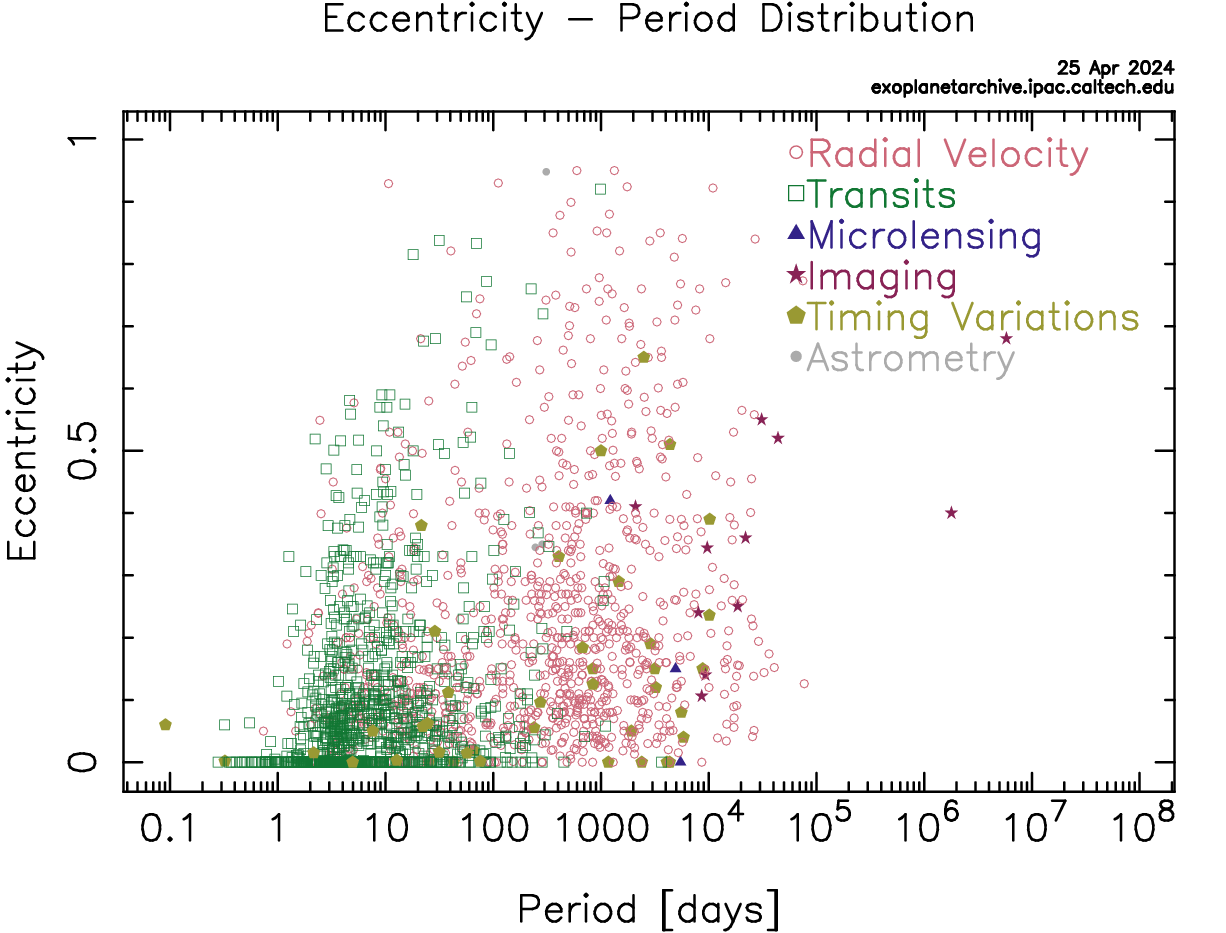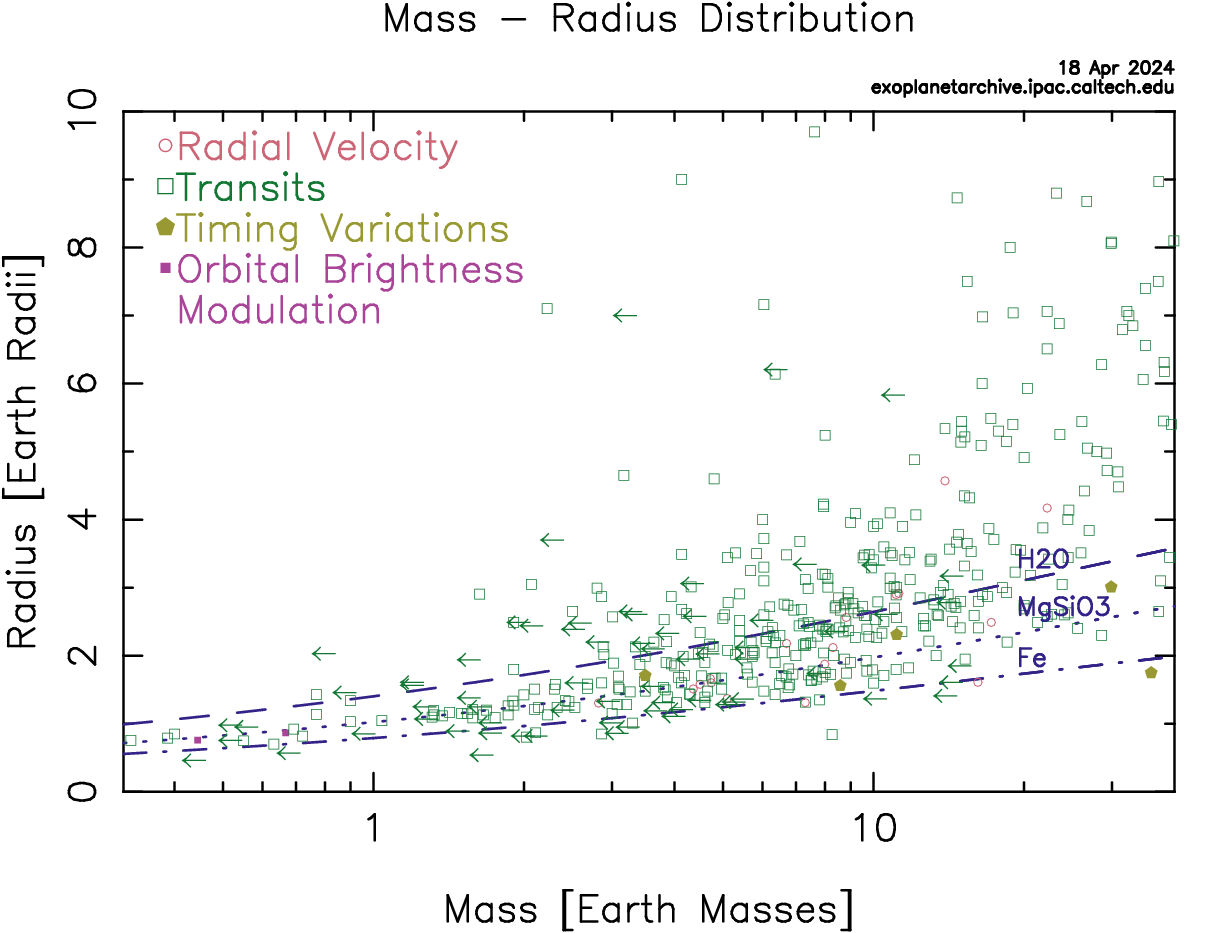Astro 497: Week 1, Friday
Administrative details
Computing Setup: Thanks!
Office Hours:
Thursdays 3-4pm (Zhenjuan Wang; Davey Lab 532C)
Fridays 3-4pm (Eric Ford; Zoom)
Reading Questions
Sign up for TopHat if you haven't already
Aim for asking a question each week
No more readings for coming Monday
Overview of Exoplanets
NASA's Exoplanet Science Institute (NExScI) maintains the Exoplanet Archive
They provide several up-to-date plots, such as those below.
Discoveries vs Time
question(md"Which observational techniques will we focus on in this course?")Which observational techniques will we focus on in this course?
We'll spend the first ~half of the course focusing on Radial Velocity & Transit methods.
These are the natural choices for class projects (because there's lots of data.)
During the second ~half of the course, we'll touch on most of the other methods briefly.
But we won't get as much hands-on experience using them, since you'll be working on your projects then.
Questions about Astronometry & Timing Variations
question(md"In the context of Astrometric planet searches, what are two components of motion in the plane of the sky?")In the context of Astrometric planet searches, what are two components of motion in the plane of the sky?
question(md"""In the context of the Timing Variations method, what does "time perturbations of stars with stable oscillation periods" mean?""")In the context of the Timing Variations method, what does "time perturbations of stars with stable oscillation periods" mean?
question(md"Why do we still using timing method to detect exoplanets even though we know life could not survive on these pulsar orbiting planets?")Why do we still using timing method to detect exoplanets even though we know life could not survive on these pulsar orbiting planets?
question(md"What kind of special information do we get only from the timing method of detecting exoplanets?")What kind of special information do we get only from the timing method of detecting exoplanets?
Mass vs Period vs Time
if false
md"""
## Mass-Period Distribution
$(Resource("https://exoplanetarchive.ipac.caltech.edu/exoplanetplots/exo_massperiod_cb.png", :width=>"75%"))
"""
endquestion(md"""I was wondering why the astronomy community settled on using Jupiter as the "base comparision" for studying exoplanets?""")I was wondering why the astronomy community settled on using Jupiter as the "base comparision" for studying exoplanets?
From individual objects to populations
Which features on above plot reflect intrinsic distribtion of exoplanets?
Which features reflect strengths/weaknesses of detection methods?
Correlation vs causation
Interpretting Data Responsibly
Which features are expected based on well-established astrophysics?
Which features are scientifically interesting?
What scientifically interesting questions could be addressed by...
existing data?
new observations/analysis in next $N$ years?
Period vs Eccentricity

What features do you notice?
How do you interpret those?
What hidden variables might affect your interpretation?
What about "Small" Planets?
Radius vs Period vs Time
(Zoom in on Planets from Kepler mission)
Mass-Radius Distribution

More Reading Questions
question(md"Are there any new observational techniques for detecting exoplanets now that telescopes and technology have improved?")Are there any new observational techniques for detecting exoplanets now that telescopes and technology have improved?
question(md"Will there ever be a cap to exponential growth of data availability?
Could there be a maximum on the amount of data that we can physically store and handle?")Will there ever be a cap to exponential growth of data availability? Could there be a maximum on the amount of data that we can physically store and handle?
question(md"Is there anyway we would be able to detect habitable planerts that are unlike Earth?")Is there anyway we would be able to detect habitable planerts that are unlike Earth?
What's missing from plots above?
Just for Fun Questions
question(md"Do you think there is any intelligent life on exoplanets?")Do you think there is any intelligent life on exoplanets?
question(md"Is Pluto not considered a planet because it is a free-floating object and if so is it not in orbit with the Sun?")Is Pluto not considered a planet because it is a free-floating object and if so is it not in orbit with the Sun?
Helper Code
ChooseDisplayMode()TableOfContents(aside=true)begin
using PlutoUI, PlutoTeachingTools
end question(text; v_offset::Integer=0) = Markdown.MD(Markdown.Admonition("tip", "Question", [text]));Built with Julia 1.8.2 and
PlutoTeachingTools 0.1.5PlutoUI 0.7.39
To run this tutorial locally, download this file and open it with Pluto.jl.
To run this tutorial locally, download this file and open it with Pluto.jl.
To run this tutorial locally, download this file and open it with Pluto.jl.
To run this tutorial locally, download this file and open it with Pluto.jl.